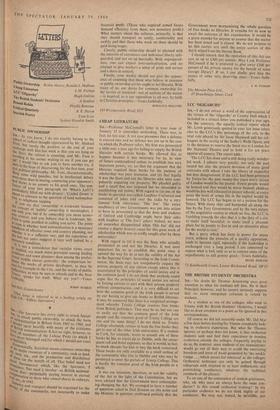" he Spectator has every right to attack Social- "
he Spectator has every right to attack Social-
of to attack public ownership, to attack the form I shrialionalisation in Britain from 1945 to 1960; and of British agree heartily with many of the criticisms Ptish nationalisation. It has no right, however, to have all members of the Labour Party (to which ,e never sbelonged and for which I should not vote) Qocialist Peon • of th olnically, Socialism means common ownership oil major resources of a community, such as land, 01. t,s'ecl, etc., and the production and distribtition ea, ncse for the benefit of all. That belief need not tall bureaucracy which, like the Spectator. I isarrnirlate• Nor need it involve—as British national- ca_l°n does—perpetually paying interest in eternal t4'etcPensation945 to those who owned shares in railways, 1. teivilidustrY and transport should be organised for the 'ee of the community, not, necessarily to make
financial profit. (Those who required armed forces demand efficiency from them, not monetary profit.) What matters about the railways, primarily, is that they should transport us safely, comfortably and swiftly and -that those who work on them should be paid living wages. Clearly, public ownership should be planned with the interests of consumers and individual liberty safe- guarded, and not set up hurriedly. With unprepared- ness, one can expect over-centralisation, and no attempt to give workers a sense of pride and service and a share in control.
Finally, your weekly should not give the appear- ance of assuming that those who believe in common or public ownership arc (or ought to be) Marxist. With many of us, our desire for common ownership for the service of mankind—not of sections of the nation —is inspired, as is our opposition to all war, by faith in Christian principles.—Yours faithfully, RONALD S. MALLONE






































 Previous page
Previous page